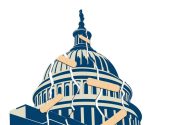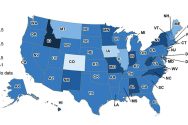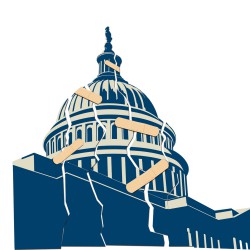Democracy is the worst form of government except for all those other forms that have been tried.
Can This Democracy Be Saved?
Let’s agree that we disagree.
We’re a nation divided — by complex issues, by political parties, by seemingly irreparable differences.
And yet:
Citizens are still going to the polls, despite a somewhat broken voting system. Teachers are finding ways to civilly discuss civics in the classroom.
The phenomenon of social media is getting young people involved in politics — and getting out the vote.
In this special section,
On Wisconsin turned to UW experts to examine the state of our democracy and tell us if there’s reason to hope.
Published in the Fall 2014 issue










Comments
fei ma August 31, 2014
AS far as I can see, democracy is not perfect but still good.
John Cerniglia '66 September 3, 2014
This well written compilation of articles explores how divided our country has become. Somewhere in my lifetime we turned the word COMPRIMISE into an epithet that has turned politics into a blood war. We seem, as a nation, to be intent on self-destruction waged upon ideologies of competing billionaires. On Wisconsin!
Perhaps some of us will sift and winnow, and in the process we might save us from ourselves.
Kara Reishus '86 September 4, 2014
The writer of this article should be informed that the United States of America is a republic, not a democracy.
Kara Reishus '86 September 4, 2014
~BS Economics 1986
The writer should note that although we certainly employ many democratic principals in the in governance of our great nation, we were founded as a republic, not a democracy.
This is evidenced in the words of our Pledge of Allegiance: “I pledge my allegiance to the United States of America, and to the republic for which it stands…..”
Fred Stohl '85 September 6, 2014
Perhaps we should un divide the country and have a one party system?
Fred Stohl - 85 September 6, 2014
If a politically divided country is such a big problem, perhaps we should abolish the two party system.
Brian October 3, 2014
It’s a small error in the context of the whole series, but it’s bizarre to see The Hunger Games described as being about economic justice, when the very overt issue is that of fascism, tyranny, and government repression. The trilogy is a morality play, about what happens when a central government is given (or takes) too much power. Jenny Price really went wrong on that point.
Winston Smith October 14, 2014
Don’t blame me, I voted for Kodos.
Riley Garcia October 14, 2014
I was a bit surprised that comments were debating republic v. democracy as opposed to commenting on the actual issues that are discussed in the articles. The fact is that whatever you choose to call it, it’s broken. It is disheartening to see how many people do not bother to vote. It is embarrassing to watch members of congress behaving like first graders. It is humiliating to see billionaires and corporations running rampant with our government. I would like to believe that folks will wake up and get involved in the political process. I am sadly, not very optimistic for the future. When our Supreme court, charged with providing justice for the American people, rules that corporations are people, we are in serious trouble.
Rachel Baker October 14, 2014
How horrifying to consider a society with no division of opinion. If that’s what you want feel free to move to North Korea. Our country was built on the idea of freedom, including the freedom to disagree, vocally, in public. Sure some people have ideas that are ridiculous and humiliating, but feel free not to elect them!
Scott October 17, 2014
Yes, but only if governmental wages (actualized pay including all benefits received currently and to be seen upon retirement) are set inline with median income of their respective communities, taking into account qualifications. When governmental jobs exceed median incomes in some locations by 10-20x, or more, of median income, we see governmental officials making choices, which do not benefit the populous and their employer. This, I think, dissuades people to believe democracy has been supplanted with an autocratic hegemony and the kings men have become the kings. To restore democracy our communities need to stand up and set the wages of the people they employee based upon marker established by socioeconomic factors of the communities in which they are employed not factors determined on the macro-scale which may not be relevant to standard of living needed within the micro-scale. Why vote for a leader, mayor etc, if leader’s hands are tied by inordinate percentage of tax dollars going to pay for municipal employees.
Michelle October 18, 2014
America is a constitutional republic, not a democracy. In a democracy, there is unlimited majority rule. In a republic, individual rights are protected from majority rule which would otherwise impede upon individual rights. This is a crucial distinction that too many people are unaware of. “Democracy” does not appear once in the Constitution, the Declaration of Independence, or any of the state constitutions. The Founding Fathers intentionally created a republic, not a democracy, so that Americans would not be ruled by the whim of the majority. The perfect example of the failings of democracy is ancient Greece, where Socrates was killed because the majority believed he was a threat to society and deserved to die, despite the fact that he never initiated force or violated anyone’s rights. In a republic, such an occurrence would be prohibited due to the objective rule of law.
This video clarifies this issue well: http://www.youtube.com/watch?v=j7M-7LkvcVw#t=508
http://asparkofpassion.wordpress.com/2014/09/17/the-importance-of-september-17th/
Scott October 24, 2014
What’s more is elected representatives tend to make less than median income in districts and often times less than semi-permanent, more influential, positions found within multiple levels of governance creating an insulary affect: whereby, specially interested governmental positions carry more power than does the citizenry, in my opinion. If this is the way governance functions, we ought to run studies of demographics of these particular bureaucrats along with their motives in decision making processes to ensure the people in these positions accurately reflect demographics of population as a whole, or simply pass referendums where less political power/sway/clout is vested in these long term positions simply by reducing actualized wages to rid branches of corrupt hiring/retention processes in what has become quasi-democratic rule.